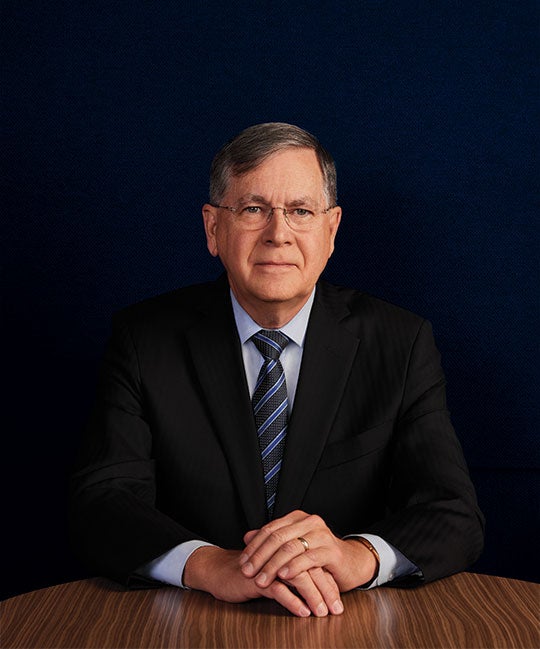Policy and People
Rice’s Baker Institute delivers data-driven research and independent discourse on critical issues.

Spring 2024
By Tracey Rhoades
For 30 years, the Baker Institute for Public Policy has served as a nucleus for public policy research, engaging with scholars from across campus and throughout the world. Today, it’s home to over 200 experts on a wide range of domestic and foreign policy issues and has a reputation as one of the country’s premier university-affiliated think tanks.
The institute’s namesake, James A. Baker III, former U.S. secretary of state, said his initial hope for the institute was to bring together “statesmen, scholars and students” and serve as “a bridge between the world of ideas and the world of action.”
“The institute has built an extraordinary reputation — in Houston, in the nation’s capital and beyond the United States — as a trusted, independent, nonpartisan source of expert, actionable insights,” says David Satterfield, the institute’s director.
Home to six centers, the institute brings renowned experts to campus to participate in lecture series and panel discussions fitting each center’s focus. One of these, the Edward P. Djerejian Center for the Middle East, has been involved in conflict resolution for years, with research focused on the civil war in Syria, security in Afghanistan and, most recently, the Israel-Hamas war.
Today, our work is more important than ever.
Satterfield, the former U.S. ambassador to Lebanon and Turkey, was appointed special envoy for Middle East humanitarian issues by President Joe Biden in 2023 and is currently leading U.S. diplomacy to address the humanitarian crisis in Gaza, in coordination with the United Nations and U.S. partners.
Student involvement is an integral part of the institute’s mission. Hundreds of undergraduates have benefited from the Baker Institute’s robust internship program as well as participation in the Summer in D.C. Internship Program. The institute partners with the School of Social Sciences to offer a master’s degree in global affairs, and its experts teach undergraduate and graduate courses across campus.
“Today, our work is more important than ever. In a polarized society, the institute provides space for discussion and informed recommendations. Our experts apply rigorous, fact-based analysis to a broad spectrum of foreign and domestic policy topics,” Satterfield says. “We embrace interdisciplinary collaboration and remain flexible to address the most pressing issues of the day.”
Prominent Baker Institute experts are addressing health care, child care, energy and more.
By Katy Munger
$4 trillion: What the U.S. spends each year on health care — far more than any other developed country
Economist Vivian Ho has devoted her career to examining health economics and its impact on governments, organizations and people, particularly the impact that health care costs can have on the lives of those forced to prioritize rent, food and medical care. She also leads multiple research projects aimed at addressing the high cost of hospital care and the effect of inflation on medical decisions. Governments and policymakers around the world rely on her analysis to make informed decisions on regulatory frameworks, public health initiatives and more. As the cost of health care continues to rise, Ho’s work will be critical in shaping economically sustainable policies that improve health outcomes.
“Most of [what’s happening at] the border is actually legal activity that benefits all of us.” — Tony Payan
Fellow for Mexican studies Tony Payan analyzes the dynamics of the U.S.-Mexico border, from border governance and population flows to security, crime and economic dependencies. Grounded by a practical understanding of the relationships between the U.S. and its southern neighbors, he educates the public about border issues through podcasts, seminars and media appearances that bring clarity to hot-button issues often influenced by rumor rather than facts. Payan’s work is helping build more effective policies involving such critical areas as national security, immigration, trade partnerships, public health and regional stability.
“Energy Kingdoms”
Energy studies fellow Jim Krane explores the challenges faced by oil-exporting countries as they navigate energy subsidies, internal demand and climate change. His expertise on the global energy landscape comes from two decades as a correspondent for the Associated Press; his book “Energy Kingdoms: Oil and Political Survival in the Persian Gulf” is considered to be the definitive study of energy demand in the Gulf region. By studying the strategic interactions among nations over the production and control of energy resources, Krane is expanding the public understanding of how geopolitics affects economic growth and global political influence.
The average American family spends 13% of their household income on child care — even more than on food.
Public finance fellow Joyce Beebe ’07 has emerged as a leading analyst in the field of child care policy and its impact on the economic health of families and societies. Drawing on international examples, her work explores new policy options ranging from universal prekindergarten and expanded tax credits to provider and employer subsidies. Her research suggests that policymakers should consider innovative solutions, given the far-reaching implications child care policies have for America's future, including its ability to influence economic growth, workforce participation, business competitiveness, gender equality, child development and poverty reduction.
“For all of the pressure to paint the oil and gas business as riding off into the sunset, the fact of the matter is that replacing these commodities will be exceedingly painful.” — Michelle Michot Foss
Energy, minerals and materials fellow Michelle Michot Foss is a leader in energy resources research who is currently developing a searchable database of mineral availability around the globe. Her wide-ranging background includes four decades of experience in energy, environmental research, consulting and investment banking. She helped pioneer international collaboration in the field of resource exploration and has spearheaded professional or energy development programs in 40 countries and regions. Known for her work highlighting the crucial role of minerals in the transition to low-carbon energy systems, her research touches many other policy areas, including energy security, economic development, technological innovation, geopolitical dynamics and environmental protections.
Learn more at bakerinstitute.org.
